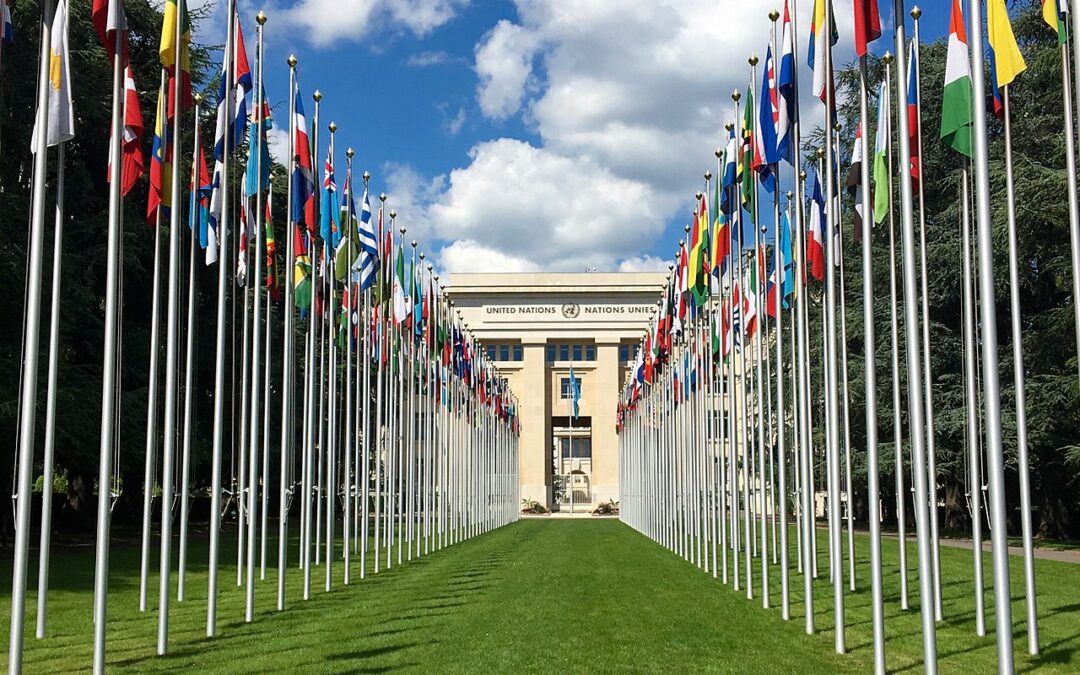
Dec 21, 2018 | Multimedia items, News, Video clips
The ICJ invited a number of women lawyers to Geneva to participate in a training workshop and gain practical experience of UN human rights mechanisms as part of a project supported by the German Mission to the United Nations in Geneva.
One group of women came to Geneva in June during the 38th session of the UN Human Rights Council and 70th session of the Committee on the Elimination of Discrimination against Women, and the other group came in September to coincide with the 39th session of the Human Rights Council.
During the week long training workshops participants learned about the international human rights mechanisms available to tackle issues of women’s access to justice and gained hands-on exposure to the operation of these mechanisms in practice.
Participants spoke about the impact that the CEDAW Convention has had in their domestic legislation.
Donia Allani a lawyer and lecturer at the Faculty of Legal, Political and Social Sciences of Tunis, discussed the impact of CEDAW in shaping legislation in Tunis to eliminate violence against women and facilitate access to justice but noted that women still faced stigmatization.
Donia Allani commented, however, that UN mechanisms could be improved to ensure that all activists and feminists can access these mechanisms without fear of reprisals.
Uzbek lawyer Sabina Saparova, also spoke of the impact that international law and standards can have domestically. She explained that Uzbekistan’s ratification of the CEDAW Convention provided an international commitment to incorporating equality between men and women into its legal structure. Recently the president of Uzbekistan initiated the first steps toward the adoption of a law on the prevention of domestic violence.
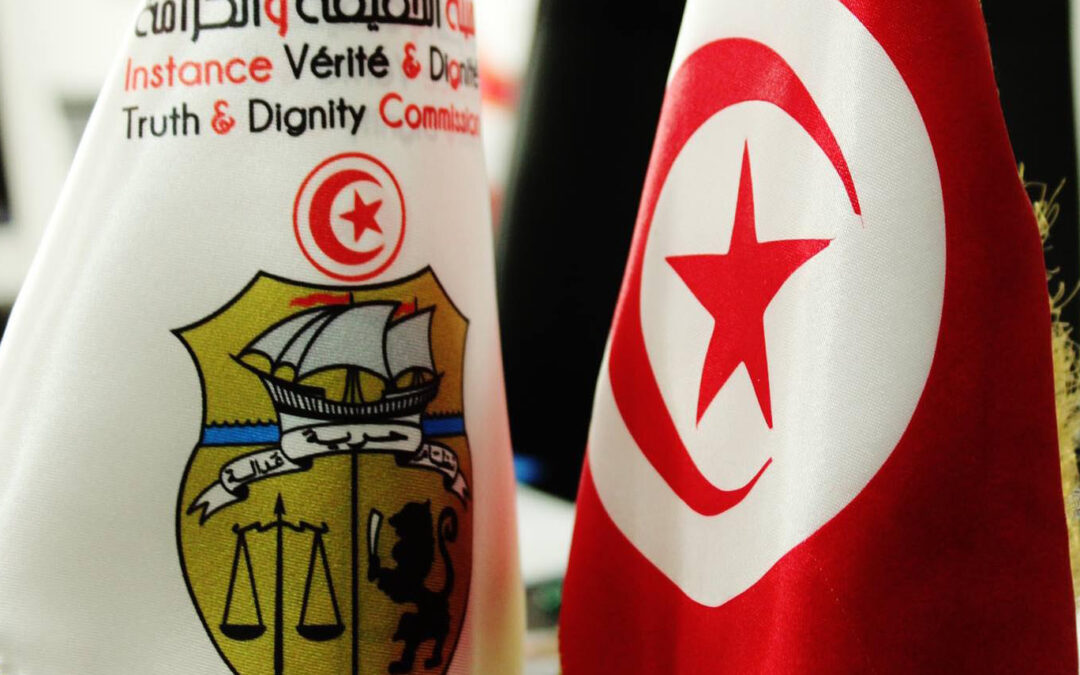
May 25, 2018 | News
The ICJ today called on the Tunisian Parliament to reverse its decision of 26 March 2018 and allow the Truth and Dignity Commission (IVD) to carry out its mandate for at least another year.
The IVD should be in the position to finalize its investigations of past serious human rights violations in the country and, when appropriate, refer cases to the Specialized Criminal Chambers (SCC), the ICJ added.
Since its decision, the Parliament has not considered or adopted any measures to address the legal and practical consequences, including how incomplete investigations by the IVD will be handled, how other investigations will be transferred to the SCC and by whom, how evidence will be preserved and protected, how the documents and the material gathered by the IVD will properly be archived, and what would happen if the IVD were unable to complete the drafting of the final report.
The initial four-year term of the IVD ends on 31 May 2018.
“It’s absolutely irresponsible for the Tunisian Parliament to thwart the whole transitional justice process and curtail the work of the IVD without providing any path forward,” said Said Benarbia, ICJ MENA Director.
“As one of the three branches of government, the Parliament must abide by Tunisia’s obligations under international law to establish the truth about past human rights violations, bring the perpetrators to account, and provide victims with effective remedies and reparation,” he added.
The March decision runs counter to all these obligations.
It denies the rights of victims, and broader society, to know the truth, including about the circumstances and reasons that led to decades of serious human rights violations in the country.
The IVD has not been able to finalize its investigations or produce its final report.
It also shields those responsible from criminal accountability. Only eight cases have so far been referred by the IVD to the SCC.
The fate of cases that have been investigated but are not referred before 31 May 2018 remains unclear. The IVD reportedly received some 62’712 complaints.
“The Parliament is abdicating its responsibility to respect and protect victims’ rights,” Benarbia said.
“Instead of playing cynical political games that can only foster impunity, the Parliament should reverse its decision and remove all the obstacles that might impede the IVD’s work in ensuring accountability for past abuses, ” he added.
Contact
Said Benarbia, Director of the ICJ Middle East and North Africa Programme, t: +41798783546, e: said.benarbia(a)icj.org
Background
Under the 2013 law on transitional justice, the IVD initially had a four-year term, with the possibility of renewal for a single additional year, on the basis of a reasoned decision by the IVD.
The 2013 law provided that the IVD’s decision on renewal should be submitted to the Parliament.
The law is however silent as to whether the submission of the IVD decision was simply a matter of notification, or required approval of Parliament to be effective.
In any event, 68 members of the Parliament voted on 26 March against extending the term of the IVD for another year.
Under its bylaws, for decisions of Parliament to be valid they must be adopted by at least 72 of its members.
The apparent lack of quorum for the Parliament’s 26 March decision has only introduced more uncertainty and confusion, further complicating the position for the IVD and others, including most notably the victims themselves.
On 24 May 2018, the IVD and the Minister in charge of relations with constitutional bodies, civil society and human rights issued a joint statement reiterating Tunisia’s commitments to the transitional justice process as provided by the Constitution.
In the statement, the IVD was requested to transfer all cases concerning serious human rights violations to the SCC, to establish criteria on the basis of which reparation for victims will be provided, to establish compensation criteria for the Victims Fund, and to send the final report to the President of the Republic, the President of the Parliament and the President of the Government.
Tunisia-IVD Parliament-News-2018-ARA (full story in Arabic, PDF)
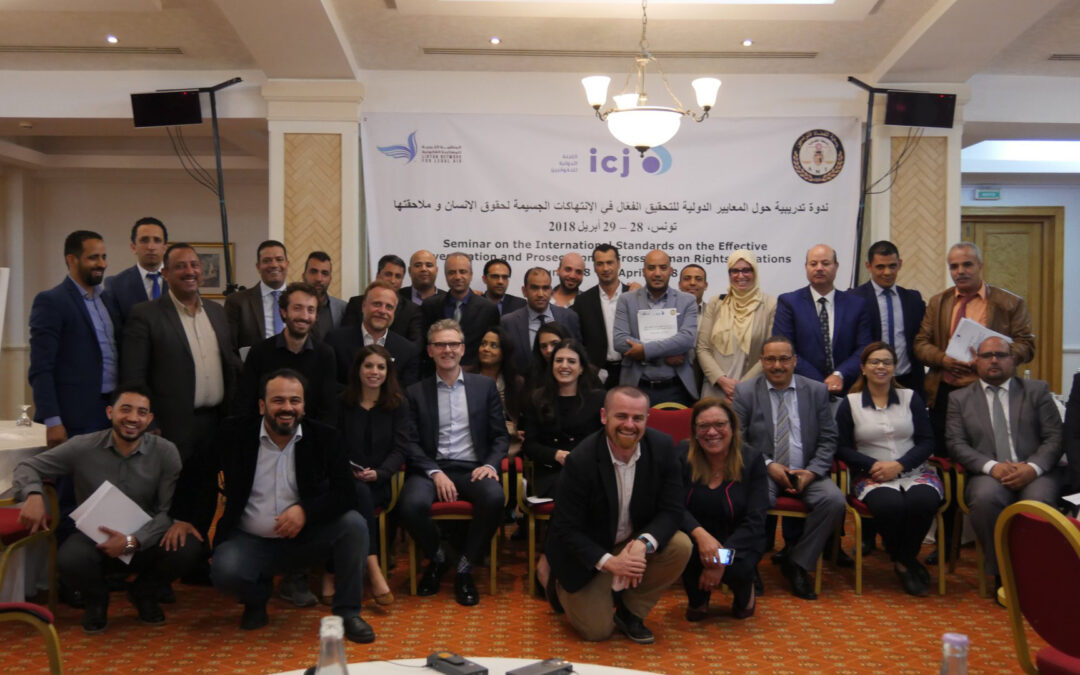
Apr 29, 2018 | News
Between 28 and 29 April 2018, the ICJ co-hosted a Seminar for judges and prosecutors from Tunisia and Libya on the international law and standards that apply to the investigation and prosecution of gross human rights violations.
The participants included more than 30 judges and prosecutors from different regions in Tunisia and Libya.
The Seminar was co-hosted with the Associations des Magistrats Tunisiens (AMT) and the Libyan Network for Legal Aid.
The event commenced with opening remarks by ICJ Commissioner, Justice Kalthoum Kennou of Tunisia.
Kingsley Abbott, Senior Legal Adviser at the ICJ, delivered a comprehensive overview of the international human rights law and standards that apply to the duty to investigate gross human rights violations.
He noted in particular that investigations of potentially unlawful deaths play a key role in accountability by upholding the right to life, which is guaranteed by Article 6 of the International Covenant on Civil and Political Rights.
He then introduced the revised Minnesota Protocol on the Investigation of Potentially Unlawful Death (2016), which sets out a common standard of performance in investigating potentially unlawful deaths or suspected enforced disappearance and a shared set of principles and guidelines for States, as well as for institutions and individuals who play a role in the investigation.
The revised Minnesota Protocol formed part of the core materials referred to at the Seminar, together with the ICJ Practitioners Guide No 9 – Enforced Disappearance and Extrajudicial Execution: Investigation and Sanction (2015).
The Seminar also covered the collection of evidence, the duty to prosecute, and fair trial rights.
Other speakers at the event included Vito Todeschini, Associate Legal Adviser at the ICJ; Aonghus Kelly, Senior Legal Adviser, EU Border Assistance Mission in Libya (EUBAM); and Martin Hackett, Senior Trial Counsel at the Special Tribunal for Lebanon in the Hague.
Contact
Said Benarbia: said.benarbia(a)icj.org
Kingsley Abbott: kingsley.abbott(a)icj.org
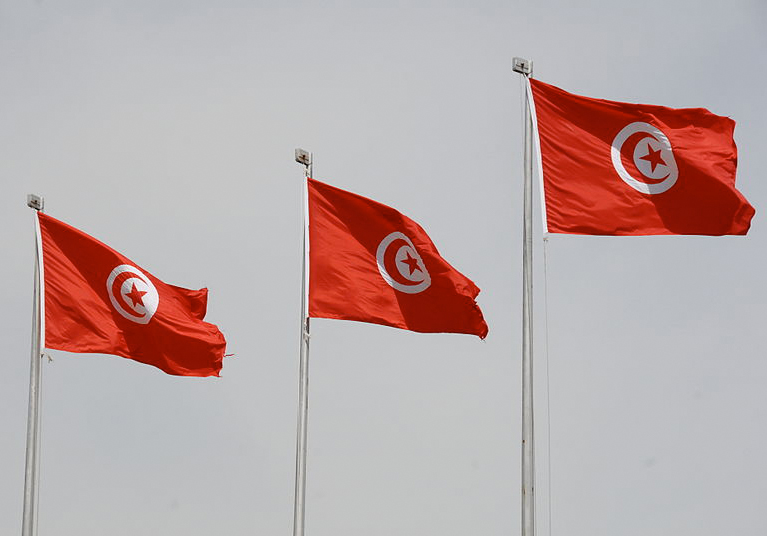
Mar 12, 2018 | News
As they begin the appointment process, the Tunisian authorities must ensure that selection of members of the Constitutional Court are made in compliance with international standards on the independence of the judiciary, the ICJ said today.
This must happen through an open and transparent process and based on prescribed, objective criteria of merit, integrity, and equality before the law, the ICJ adds.
The 2014 Constitution and the Organic Law no. 50 of 2015 on the establishment of the Constitutional Court provide that three bodies are responsible for appointing the 12 members of the Constitutional Court.
These are the Assembly of People’s Representatives (ARP), the High Judicial Council, and the President of the Republic, which each body appointing four out of the 12 members successively.
The Constitution and the Organic Law also provide that members must have 20 years of professional experience and nine of them should have advanced legal expertise.
Over the past three weeks, the ARP has been reviewing the candidates for the Constitutional Court and the election of first four members is due to take place in a general plenary on Tuesday, 13 March 2018.
“Ensuring that the selection and appointment of all members of the Constitutional Court is made on the basis of their legal qualifications, competence and personal integrity is absolutely necessary to the strengthening of rule of law and the protection of human rights in Tunisia” said Said Benarbia, Director of the ICJ Middle East and North Africa Programme.
“In electing the four members, the ARP should ensure that these criteria are fully met, and that the process safeguards against appointments for improper motives, including political considerations and arrangements between political groups,” he added.
The Tunisian authorities should also ensure that the composition of the Constitutional Court reflects the diversity of the community it serves, including by ensuring the equal representation of women in the Court, as well as a significant representation of minority groups.
In a previous memorandum, the ICJ has also urged the authorities to ensure that the selection process guarantees the independence of the institution and of the individual judges in compliance with international standards.
Contact
Said Benarbia, Director of the ICJ Middle East and North Africa Programme, tel: +41798783546, email: said.benarbia(a)icj.org
Background
Article 11 and 12 of Law no. 50 of 2015 provides that the election of candidates by the Parliament and the High Judicial Council shall take place through a secret ballot with the vote of a majority of two-thirds of their members. Article 13 provides that the President of the Republic appoints the last four members of the Constitutional Court.
The 2014 Constitution requires the establishment of the Constitutional Court within a year after the legislative elections. Four years later, and despite the entry into force of Law no. 50 in 2015, the Constitutional Court has not yet been established.
Tunisia-PR-Constitutional-Court-2018-ARA (Full Text in Arabic, PDF)
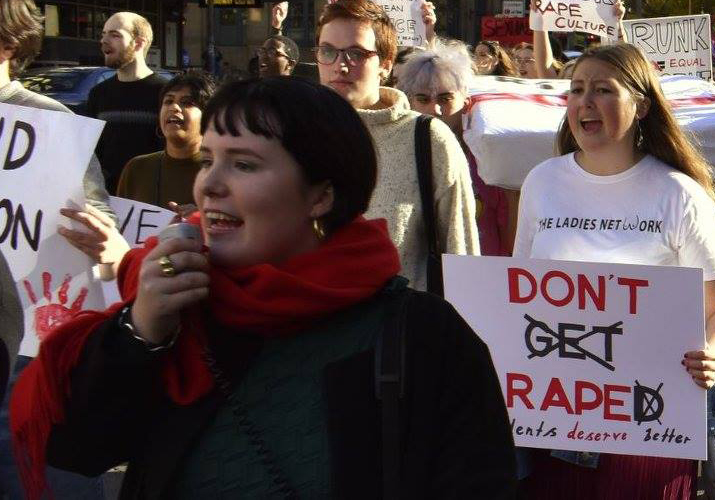
Mar 8, 2018 | Multimedia items, News, Video clips
Today on International Women’s Day the world looks to celebrate the achievements of women and advances made towards the realization of women’s human rights but the day is also an opportunity to address the issues that continue to disadvantage women.
In the 70th anniversary year of the Universal Declaration of Human Rights many women around the world have seen States failing to live up to their obligations to ensure that they are able to exercise their human rights.
Where women’s human rights are violated many women face discrimination, denial of equal protection of the law and other impediments in accessing the justice that they deserve.
“The ICJ has a strong commitment to addressing the obstacles women face in accessing justice,” said ICJ Acting Vice-President, Justice Radmila Dragicevic-Dicic.
“The judiciary has an important role in protecting the rights of women, but in many States there is a lack of proper awareness and understanding of issues such as gender based-violence. Many judges would benefit from judicial education on specific gender-based issues to ensure that women victims are made visible and their rights protected by domestic laws and relevant international standards,” she added.
For several years the ICJ has worked on women’s access to justice issues in different countries in all regions with a variety of stakeholders, including human rights defenders, lawyers, judges, governmental authorities and international rights experts and mechanisms.
For example, in Tunisia, the ICJ issued a memorandum calling on authorities to remove the obstacles women face in accessing justice.
The ICJ has held regional dialogues in Africa and Asia with judges and lawyers.
In Asia, one outcome of this was The Bangkok General Guidance for Judges in Applying a Gender Perspective, designed to assist judges in employing a gender perspective in deciding cases before them, which has since been adopted for use by judiciaries in Indonesia and the Philippines.
In Africa, the need for gendered perspectives in judicial decision-making was also raised in a regional report evaluating sexual and gender based violence (SGBV) and fair trial rights.
The ICJ has undertaken substantial work on women’s access to justice in the context of SGBV, including a report calling for an eradication of harmful gender stereotypes and assumptions and a Practitioners’ Guide on Women’s Access to Justice for Gender-Based Violence.
Both have been used as training tools in Asia, Africa and MENA, most recently at a workshop on SGBV in Swaziland.
Last year the ICJ released a memorandum on effective investigation and prosecution of SGBV in Morocco.
The ICJ has also undertaken trial observations during hearings in the landmark Sepur Zarco case, the first case that resulted in a conviction for sexual crimes that had occurred during Guatemala’s internal conflict in the early 1980s.
The ICJ regularly engages with the UN Human Rights Council and the UN Committee on the Elimination of all Forms of Discrimination against Women to highlight issues around women’s access to justice and call on the international community to be vigilant in upholding women’s rights protections.
“The ICJ is lucky to count among its number some very impressive women human rights defenders, who bring a great deal of expertise to the work of the organization,” said Dragicevic-Dicic.
“The five most recent additions to the ICJ have further strengthened the organization’s ability to speak authoritatively on women’s rights, and I look forward to working with my new colleagues to enhance women’s access to justice,” she added.
The new additions to the ICJ include Dame Silvia Cartwright, Former Governor of New Zealand; Professor Sarah Cleveland, Constitutional and Human Rights Professor at Columbia Law School in the USA; Justice Martine Comte who has over 30 years judicial experience in France; Mikiko Otani, member of the UN Committee on the Rights of the Child from Japan; and Justice Lillian Tibatemwa-Ekirikubinza from the Supreme Court of Uganda.
In an interview with the ICJ, Commissioner Justice Elizabeth Evatt, a distinguished Australian lawyer, jurist and trailblazer for women in the legal profession in her country, spoke about the importance of women being able to access justice.
One of the architects of Australia’s Family Law Act of 1975, Justic Evatt told the ICJ how the Act made divorce more accessible and abolished the Common Law relics that gave men greater rights over women, however new problems have emerged since then.
Justice Evatt explained that “(the Act) was an extremely important reform for women. It made it far easier for men and women to access divorce and have their matters dealt with because the court had conciliation and counselling services and also legal aid was more readily available. But I am afraid that since those days, thing have changed. The Family Court is now beset with delays and obstacles and it is impossible for people to get legal aid. People have to take their case on their own or face huge legal costs, so having begun well, it hasn’t continued well. More resources are needed.”
Justice Evatt also considers that there is a need for the government and the judiciary to take more action to address domestic violence.
However, she noted, “there has been a change over the years with a growing awareness of both the police and the local courts, which are the main ones dealing with violence. They have become far more aware of the need to take action to protect women and prevent violence but the cure for domestic violence does not lie just with the courts but also with the whole of society.”
Watch the interview:









